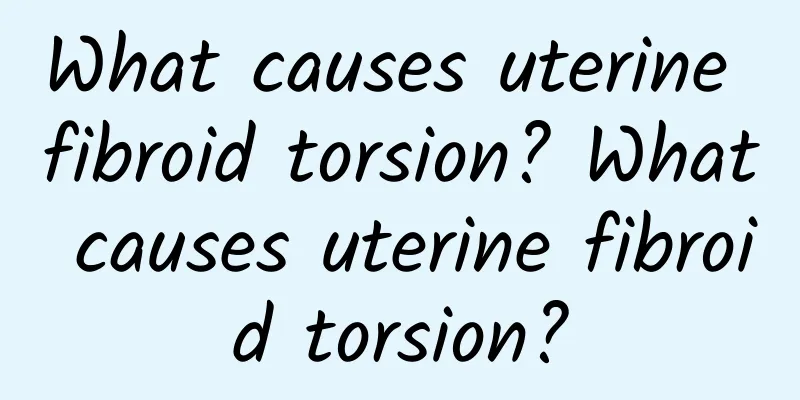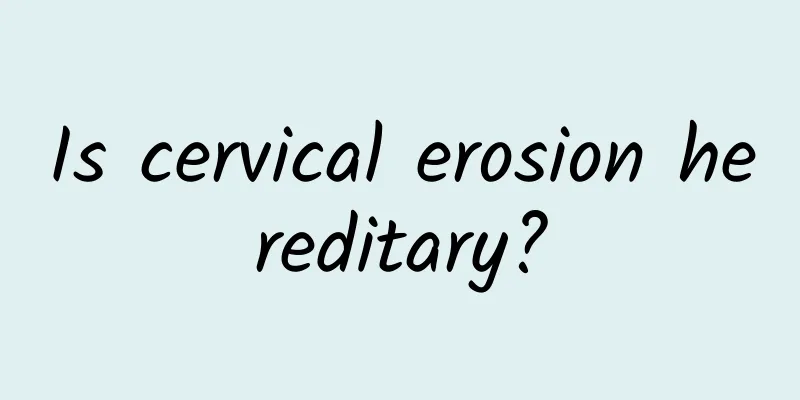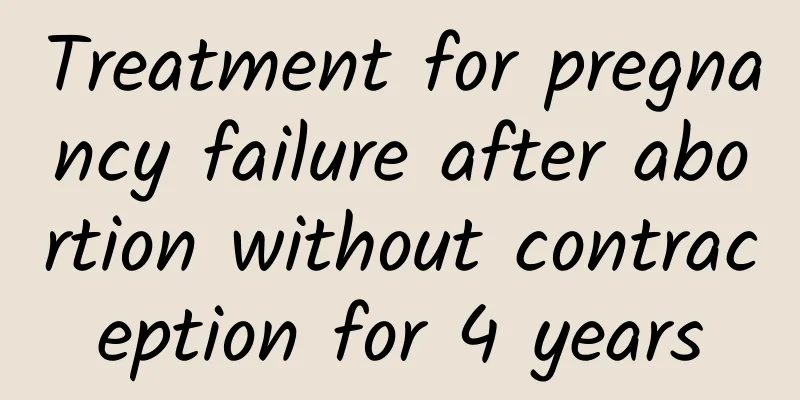What causes uterine fibroid torsion? What causes uterine fibroid torsion?

|
What causes uterine fibroid torsion? What causes uterine fibroid torsion? Uterine fibroids are common benign tumors that grow in the wall of the uterus and usually do not cause symptoms. However, sometimes fibroids can twist, causing severe pain and complications. Uterine fibroid torsion occurs when a uterine fibroid twists or turns under conditions of restricted blood supply, resulting in a disruption in blood supply. In this case, the blood supply to the fibroid is cut off and the fibroid is damaged by lack of blood supply. So, what is the cause of uterine fibroid torsion? Generally speaking, the following factors may cause uterine fibroid torsion: 1. Location of the fibroids: If the fibroids are located at the bottom of the uterus, the risk of torsion is higher. This is because the bottom is more flexible and can be easily twisted or rotated by the fibroids. 2. Size of the fibroid: Larger uterine fibroids are more likely to torsion because the larger the fibroid, the heavier it is, and the easier it is to move or twist in the uterus. 3. Pregnancy: During pregnancy, the uterus expands and the fibroids also grow. This increases the risk of torsion because the space becomes smaller after the uterus expands, and the range of movement of the fibroids becomes narrower, which can easily lead to torsion. Uterine fibroid torsion is an emergency that requires prompt medical intervention. The following symptoms may mean that your uterine fibroid is torsion: 1. Severe abdominal pain: Abdominal pain may be the most prominent symptom, which can manifest as severe, persistent abdominal pain, and may even require bed rest. 2. Dizziness or fainting: Due to the interruption of blood supply caused by torsion, hypoxia may occur, leading to symptoms of dizziness or fainting. 3. Gradually increasing fatigue or weakness: Due to the obstruction of blood supply to the fibroids, torsion of uterine fibroids may cause increasing fatigue or weakness. In terms of science, it is important to understand that uterine fibroid torsion is uncommon and most uterine fibroids do not torsion. However, it is very important to understand the risk factors for torsion, especially for women who have been diagnosed with uterine fibroids. If you have been diagnosed with uterine fibroids, you can take the following steps to reduce your risk of uterine fibroid torsion: -Regular check-ups: Have regular uterine ultrasounds to understand the size and location of your fibroids. This way, you can detect any abnormalities in time and discuss further treatment measures with your doctor. -Pay attention to your diet: Some studies have shown that dietary habits may be associated with the development of uterine fibroids. Maintaining a healthy diet with an adequate intake of vegetables and fruits may help prevent fibroid torsion. - Maintain your weight: Obesity may be associated with the development of uterine fibroids. By maintaining a healthy weight, you can reduce your risk of developing uterine fibroids and their torsion. In general, it is important to understand the risk factors for uterine fibroid torsion. If you experience symptoms, seek medical attention and receive professional treatment. If you have been diagnosed with uterine fibroids, it is important to maintain regular communication and checkups with your doctor to detect any signs of torsion in time and avoid complications. |
>>: Can you feel uterine fibroids? Can you feel uterine fibroids?
Recommend
Does ovulation bleeding mean that ovulation has occurred?
Ovulation bleeding does not necessarily mean that...
Zhao Wei lost 12kg by drinking sweet potato soup and red date soup? Doctor: Be careful of becoming more hungry and thirsty when drinking soup to lose weight
Female celebrities all like to be praised: "...
Does scanty menstruation mean menopause?
Oligomenorrhea belongs to the category of menstru...
Causes of Endometriosis
When it comes to endometriosis, the first thing y...
What are the types of dysmenorrhea?
Many people know that dysmenorrhea is a common gy...
The most important harm of painless abortion
Painless abortion is one of the methods that more...
Is abdominal chocolate cyst a serious disease?
Abdominal chocolate cyst is a type of chocolate c...
Losing weight after a vacation? 6 tips for a healthy vacation without gaining weight
Traveling and vacationing can make people relax a...
Can cervical precancerous lesions be cured?
Cervical precancerous lesions are a relatively se...
What causes women to develop cervical precancer?
If cervical erosion is not treated for a long tim...
How to use medication for vulvar leukoplakia
The chances of women suffering from vulvar leukop...
If you love to eat fried chicken and braised food, you will get edema! Eliminate edema with these two powerful tools
Office workers are busy with work, and it is comm...
Can I take a shower and wash my hair after having an abortion?
You can take a shower and wash your hair after an...
Doctors rely on various female vaginitis symptoms to diagnose the condition
The symptoms of female vaginitis are mainly cause...
Is it better for women to have a medical abortion or a surgical abortion for their first pregnancy? Some common sense about abortion for women
Many people are familiar with the term "abor...









